Potřebujeme váš souhlas k využití jednotlivých dat, aby se vám mimo jiné mohly ukazovat informace týkající se vašich zájmů. Souhlas udělíte kliknutím na tlačítko „OK“.
ASTM E749/E749M-12
Standard Practice for Acoustic Emission Monitoring During Continuous Welding
Automaticky přeložený název:
Standardní praktiky pro akustické emise monitorování průběhu kontinuálním svařováním
NORMA vydána dne 15.6.2012
Informace o normě:
Označení normy: ASTM E749/E749M-12
Poznámka: NEPLATNÁ
Datum vydání normy: 15.6.2012
Kód zboží: NS-47884
Počet stran: 5
Přibližná hmotnost: 15 g (0.03 liber)
Země: Americká technická norma
Kategorie: Technické normy ASTM
Kategorie - podobné normy:
Hluk působený stroji a zařízeními
Svařovací procesy
Svařování, tvrdé pájení a měkké pájení obecně
Anotace textu normy ASTM E749/E749M-12 :
Keywords:
continuous welding, fusion solidification, heat-affected zone, high-temperature sensors, in-process defect location, thermal stress, wave guides, ICS Number Code 17.140.20 (Noise emitted by machines and equipment), 25.160.10 (Welding processes), 25.160.01 (Welding, brazing and soldering in general)
Doplňující informace
| Significance and Use | ||||||||||||
|
Detection and location of AE sources in weldments during fabrication may provide information related to the integrity of the weld. Such information may be used to direct repair procedures on the weld or as a guide for application of other nondestructive evaluation (NDE) methods. A major attribute of applying AE for in-process monitoring of welds is the ability of the method to provide immediate real-time information on weld integrity. This feature makes the method useful to lower weld costs by repairing defects at the most convenient point in the production process. The AE activity from discontinuities in the weldment is stimulated by the thermal stresses from the welding process. The AE activity resulting from this stimulation is detected by AE sensors in the vicinity of the weldment, which convert the acoustic waves into electronic signals. The AE instrumentation processes signals and provides means for immediate display or indication of AE activity and for permanent recordings of the data. Items to be considered in preparation and planning for monitoring should include but not be limited to the following: Description of the system or object to be monitored or examined, Extent of monitoring, that is, entire weld, cover passes only, and so forth, Limitations or restrictions on the sensor mounting procedures, if applicable, Performance parameters to be established and maintained during the AE system verification procedure (sensitivity, location accuracy, and so forth), Maximum time interval between AE system verification checks, Performance criteria for purchased equipment, Requirements for permanent records of the AE response, if applicable, Content and format of test report, if required, and Operator qualification and certification, if required. |
||||||||||||
| 1. Scope | ||||||||||||
|
1.1 This practice provides recommended guidelines for acoustic emission (AE) monitoring of weldments during and immediately following their fabrication by continuous welding processes. 1.2 The procedure described in this practice is applicable to the detection and location of AE sources in weldments and in their heat-affected zone during fabrication, particularly in those cases where the time duration of welding is such that fusion and solidification take place while welding is still in progress. 1.3 The effectiveness of acoustic emission to detect discontinuities in the weldment and the heat-affected zone is dependent on the design of the AE system, the AE system verification procedure, the weld process, and the material type. Materials that have been monitored include low-carbon steels, low-alloy steels, stainless steels, and some aluminum alloys. The system performance must be verified for each application by demonstrating that the defects of concern can be detected with the desired reliability. 1.4 Units—The values stated in either SI units or inch-pound units are to be regarded separately as standard. The values stated in each system may not be exact equivalents; therefore, each system shall be used independently of the other. Combining values from the two systems may result in non-conformance with the standard. 1.5 This standard does not purport to address all of the safety concerns, if any, associated with its use. It is the responsibility of the user of this standard to establish appropriate safety and health practices and determine the applicability of regulatory limitations prior to use. |
||||||||||||
| 2. Referenced Documents | ||||||||||||
|
Podobné normy:
Historická
1.4.2011
Historická
1.1.2013
Historická
15.6.2012
Historická
1.6.2013
Historická
1.4.2009
Historická
1.1.2010


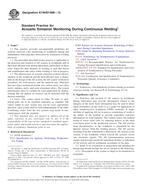
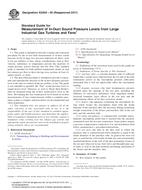 ASTM E2459-05(2011)..
ASTM E2459-05(2011)..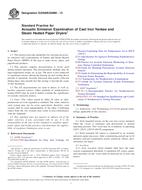 ASTM E2598/E2598M-13..
ASTM E2598/E2598M-13..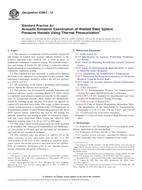 ASTM E2863-12
ASTM E2863-12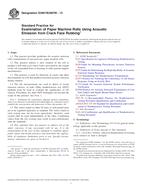 ASTM E2907/E2907M-13..
ASTM E2907/E2907M-13..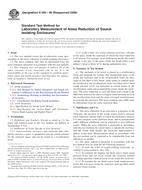 ASTM E596-96(2009)..
ASTM E596-96(2009)..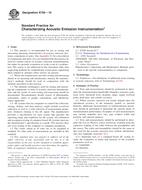 ASTM E750-10
ASTM E750-10
 Cookies
Cookies
